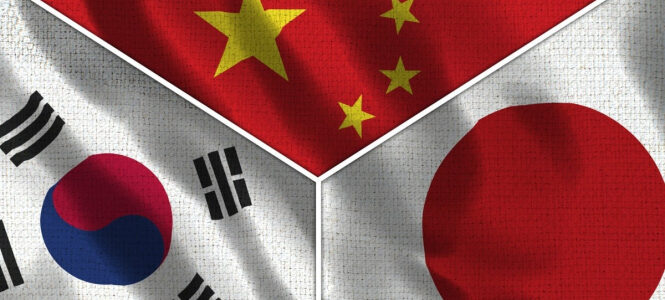
In the first trilateral meeting since 2019, the neighbors sought common ground on trade and cultural exchange while tiptoeing around thorny security issues.
The leaders of South Korea and Japan on Monday sought to restore economic cooperation with China, their largest trading partner, after years of deteriorating relations, but their trilateral talks were overshadowed by rising tensions between China and the United States, Seoul and Tokyo’s most important military ally.
The trilateral meeting, which was attended by South Korean President Yun Seok-yeol, Japanese Prime Minister Fumio Kishida, and Chinese Premier Li Keqiang, the second highest-ranking official, was the first in four and a half years.
The talks focused mainly on areas where it is easier to find common ground, such as protecting supply chains, facilitating trade, and cooperating to address aging populations and emerging infectious diseases. The leaders tiptoed around sensitive regional security issues such as Taiwan and North Korea.
“The three countries agreed to expand practical cooperation so that their peoples can experience its benefits,” Mr. Yun said during a joint press conference with Messrs. Kishida and Lee, declaring 2025 and 2026 “years of cultural exchanges” between the three countries.
But in the hours before the meeting, North Korea helped to emphasize the major differences between the three neighbors. Pyongyang announced that it would launch a long-range rocket within nine days to put a military spy satellite into space. United Nations Security Council resolutions prohibit the country from launching such missiles because they use the same technology needed to build intercontinental ballistic missiles.
North Korea’s increasingly aggressive military posture is a concern for South Korea and Japan. The North has also expanded its arms trade with Russia in defiance of UN sanctions, supplying artillery shells and missiles for Moscow’s military operations in Ukraine, according to US and South Korean officials. In response, Moscow has been accused of providing energy and technological assistance that could contribute to North Korea’s missile program.
South Korea and Japan have called on China, North Korea’s biggest benefactor, to use its economic clout to help curb Pyongyang’s nuclear and missile programs. Until now, Beijing has been reluctant to use this leverage, viewing North Korea as a buffer against the U.S. military on the Korean Peninsula.
On Monday, both Mr. Yun and Mr. Kishida sharply criticized the North Korean plan to launch the satellite. But Mr. Li, who serves under Xi Jinping, China’s top leader, did not condemn North Korea, but merely called on all sides to “exercise restraint” and work toward a “political settlement.”
As the press conference in Seoul was winding down, 20 South Korean warplanes conducted air drills south of the inter-Korean border as a warning of “immediate and strong” retaliation for North Korea’s provocation.
China, Japan and South Korea have agreed to hold a trilateral meeting every year since 2008 to discuss regional cooperation. But the plan has often been disrupted by diplomatic disputes, and most recently by the pandemic. Monday’s meeting in Seoul was the ninth such meeting and the first since December 2019.
During the years-long hiatus, strategic competition between Washington and Beijing has intensified, which has also deteriorated relations between China and the two US allies. China has flexed its military muscle and expanded its territorial ambitions in the South China and East China Seas, while the United States, Japan, and South Korea have increased the number of joint military exercises and strengthened missile defense and other security cooperation.
China’s ties with the two U.S. allies have become so strained in recent years that analysts say the revival of the trilateral summit is an achievement in itself. But common interests compelled Beijing and its two neighbors to revive it.
Mr. Yun said on Monday that the three countries had agreed to hold regular summit meetings.
East Asia’s neighboring countries, which together account for more than a fifth of global economic output, need regional stability and cooperation, especially in supply chains, to recover from the post-pandemic economic downturn. While Japan and South Korea consider the United States their most important ally, hosting 80,000 U.S. troops, their leaders face pressure at home from businesses competing for better access to China.
China is betting that it can appease Japan and South Korea by offering them greater access to its market and reducing Washington’s influence. To this end, China has agreed to resume negotiations on a free trade agreement between the three neighbors, emphasizing increased economic cooperation as a means of maintaining regional peace and stability.
He portrayed the United States as meddling in Asian affairs, pressuring Japan and South Korea to form a bloc to curb China’s development. Washington has built a wall of restrictions to deny Beijing access to the latest semiconductors and is calling on allies such as Japan and South Korea to cooperate.
On Monday, Mr. Li indirectly criticized Washington, calling for a “multipolar” world order and opposing any attempts to create “blocs” and “politicize” trade issues.
In recent years, Japan and South Korea have grown closer, improving relations that have long been strained by historical disputes. They have also expanded trilateral military cooperation with the United States to deter North Korea and China.
Japan and South Korea have called on China to address concerns about the difficulties of doing business in China. Mr. Kishida called for the speedy release of Japanese citizens detained in China on suspicion of espionage.
During bilateral talks on Sunday, South Korea and China agreed to establish new channels to discuss security and supply chain cooperation, said Kim Tae-hyo, deputy director of national security in Mr. Yoon’s office.
Mr. Yoon’s policy of bringing South Korea closer to the United States has coincided with a sharp drop in South Korean exports to China. According to government data, this year the United States overtook China as South Korea’s largest export market for the first time in two decades.
Source: https://www.nytimes.com/2024/05/27/world/asia/china-japan-korea-trilateral.html